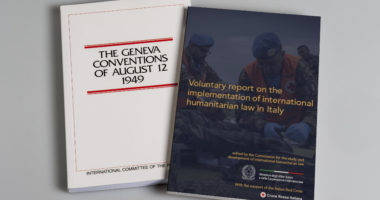Since its creation in 2000, the Bruges Colloquium on International Humanitarian Law has been jointly organized by the ICRC and the College of Europe, bringing together government representatives, international organizations, military practitioners, academics and civil society to grapple with the most urgent issues relating to the law of armed conflict. Its 22nd edition, held in October 2021, examined the enduring relevance of international humanitarian law (IHL) and the update of the ICRC Commentaries.
In this post, ICRC legal adviser Mickey Orkin unpacks some of the key issues discussed during last year’s Colloquium – conversations between hundreds of participants online from 59 countries – and the key takeaways for the work of the ICRC Commentaries team.
In my capacity as a legal adviser in the ICRC Commentaries Update Unit, I recently had the pleasure of helping organize and participating in last year’s Bruges Colloquium, entitled Same law, new wars: the enduring relevance of international humanitarian law and the importance of the updated ICRC Commentaries.
Given my current role, I was unsurprisingly eager to dive into the central focus of last year’s event: the project to update the ICRC’s Commentaries on the Geneva Conventions of 1949 and their Additional Protocols of 1977. The updated Commentaries seek to provide current interpretations of the Conventions to enhance their understanding, dissemination and faithful application in today’s armed conflicts. The Conventions themselves, over 70 years since their adoption, remain the solid foundation of, and key reference for, the protection of victims of armed conflict in an ever-changing world.
Diving into the substance
The Colloquium’s presentations were as varied as they were engaging. One panel was dedicated in full to the Third Geneva Convention. In it, Cordula Droege, ICRC’s chief legal officer and head of our legal department here, considered the continued relevance of the protection of prisoners of war (you can read about them here). Professor Marco Sassòli considered the relevance of the Third Convention in contemporary armed conflicts, including non-international armed conflicts. Professor Camilla Guldhal Cooper presented on the modalities of detention and concerns faced by State militaries in capturing prisoners of war. The dialogue between panellists emphasized how the Third Geneva Convention remains important and relevant today, not only in international armed conflicts, but also as an embodiment of customary international law and as a possible template for treatment of detainees in non-international armed conflicts. The ICRC has recently released the updated Commentary on the Third Geneva Convention.
I myself chaired a panel focused on cross-cutting issues related to articles common to the Conventions. We heard from Colonel Nathalie Durhin, who provided a NATO perspective on Common Article 3 and non-refoulement. The updated Commentary interprets (paragraphs 744–753) common Article 3 as prohibiting Parties to the conflict from transferring persons in their power to another authority when those persons would be in danger of suffering a violation of their fundamental rights upon transfer. Another expert on this panel, Professor Yutaka Arai Takahashi, focused on the phenomenon of occupation by proxy (which is covered in the updated Commentary on common Article 2, paragraphs 362–366) and State responsibility for indirect occupation of territory through proxies. The exchange between the experts on the panel was insightful and probed the implications of the interpretations in the updated Commentary in practical terms. For example, the panel delved into some challenges States face in fully complying with the obligation of non-refoulement, arising from Common Article 3, in conflicts today.
Participants at the Colloquium also turned to questions directly relevant to the forthcoming updated Commentary on the Fourth Geneva Convention. One session was devoted to the interplay of international humanitarian law and international human rights law, and interpretation of the Fourth Convention. Professor Vaios Koutroulis considered how the interplay of international humanitarian law and human rights law, and defining the contours of State obligations, should be conceived in the updated Commentaries on the Fourth Convention. Professor Françoise Hampson considered the question of whether or not the updated Commentary on the Fourth Convention, dealing with occupation, should take human rights law into account.[1] Doctor Mirco Anderegg turned his focus to the practical implications of how the interplay between these bodies of law is interpreted for military operations abroad, and in particular, situations of occupation.
The discussion also included some opposing views on how the ICRC should interpret human rights law in the upcoming Commentary on the Fourth Convention. On the one hand, the possibility was proposed that the ICRC could be as minimalist as possible in its references to human rights law, upon the understanding that the updated Commentary is a commentary to a humanitarian law treaty. On the other hand, an alternative proposal was considered, namely, that the ICRC should refer to human rights law more expansively. According to that view, reference to human rights law is desirable, because of the critical need for the ICRC to take into account the development of human rights law. It was argued that such references to human rights law would ensure that the forthcoming Commentary is a resource which is both complete and of practical utility for those who seek guidance on how to apply the Convention.
Registered participants of the Colloquium set the agenda for our final panel. Questions were submitted on registration for the Colloquium, which we then submitted to our panellists for consideration and discussion in the final session. Panellists dealt with a range of urgent issues, including the application of the Fourth Convention in relation to urban, protracted and hybrid conflicts; proxy wars and the protection of civilians and the application of the Fourth Convention in occupation in the digital era.
Though I offer this humble sampler platter of key points, I am certainly not able to do justice to all the rich discussions which took place at the Colloquium – so consider this a teaser for the release of the proceedings of the Colloquium, which will document the presentations in Chatham House format (the proceedings are scheduled for release in the second half of 2022, and will be available here).
Together, we go farther
As Isaac Newton once wrote in a letter to Robert Hooke, ‘If I have seen further, it is by standing on the shoulders of giants’. In our work updating the Commentaries, the ICRC collaborates with many other actors. The updated Commentary on the Third Convention was produced by an ICRC team of legal advisers, with the support of many others. As was the case with the updated Commentaries on the First and Second Geneva Conventions, the drafting process of the updated Commentary on the Third Convention involved external contributors, a peer review group of some 50 experts from all around the world, and an editorial committee consisting of six senior ICRC and non-ICRC lawyers.
The Bruges Colloquium was a fine opportunity for the ICRC to listen and learn as experts voiced their opinions and participants from around the world made their points and asked their questions. All of it feeds into the work we are currently undertaking in updating the Commentary on the Fourth Geneva Convention and further contributes to the external collaboration built into our process of generating the updated Commentaries. We look forward to continuing the conversations started at the Colloquium and to many other opportunities in which we can listen and learn while we continue our work on the project to update the Commentaries on the Geneva Conventions and their Additional Protocols.
[1] For a description of how international law is interpreted in the updated Commentary on the Third Geneva Convention, see the introduction to the updated Commentary, paragraphs 99–105.
See also
- Lawrence Hill-Cawthorne, GCIII Commentary: Common Article 1 and State responsibility, January 28, 2021
- Ahmed Al-Dawoody, GCIII Commentary: an Islamic perspective on the treatment of prisoners of war, January 26, 2021
- Cordula Droege, GCIII Commentary: ten essential protections for prisoners of war, July 23, 2020






Comments